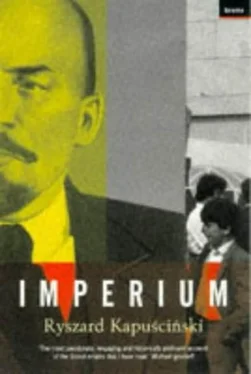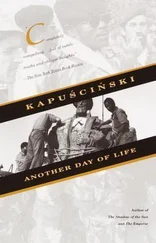
Ryszard Kapuściński
Imperium
– czyli, że to są dziwy; i to wszystko się składa na obraz -
– Imperium
ANDRIEJ BIEŁYJ
Rosja wiele widziała w ciągu tysiąca lat swoich dziejów. Jednego tylko nie widziała Rosja przez tysiąc lat – wolności.
WASILI GROSSMAN
Teraźniejszość jest czymś, co nas wiąże Przyszłość tworzymy sobie w wyobraźni. Tylko przeszłość jest czystą rzeczywistością.
SIMONE WEIL
W Rosji cała energia artysty powinna być skierowana na pokazanie dwóch sił: człowieka i przyrody. Z jednej strony słabość fizyczna, nerwowość, wczesne dojrzewanie seksualne, namiętne pragnienie życia i prawdy, marzenia o szerokiej jak step działalności, pełna niepokoju analiza, niedostatek wiedzy przy wysokich wzlotach myśli, a z drugiej – bezkresna równina, surowy klimat; surowy, szary naród z jego ciężką, ponurą historią, tatarszczyzna, czynownictwo, ciemnota, bieda, wilgotny klimat stolic, apatia słowiańska itp. Rosyjskie życie tak młóci Rosjanina, że ten się pozbierać nie może, młóci jak tysiącpudowy kij.
ANTONI CZECHOW
Zasadnicze wrażenie, jakie odnieśliśmy po przyjrzeniu się sytuacji w Rosji – to obraz olbrzymiego, nie dającego się naprawić krachu. Historia nie znała jeszcze tak gigantycznej katastrofy.
H. G. WELLS, 1920
Przygoda Związku Radzieckiego jest największym doświadczeniem i najważniejszym zagadnieniem ludzkości.
EDGAR MORIN
Rosja zwymiotowała tę ohydę, którą ją karmiono.
FIODOR DOSTOJEWSKI
Ustrój, jaki nami rządzi, to połączenie starej nomenklatury, rekinów finansjery, fałszywych demokratów i KGB. Tego nie mogę nazwać demokracją – to wstrętna, nie mająca precedensu w historii hybryda, o której nie wiadomo, w jakim kierunku będzie się rozwijać… [ale] jeśli ten sojusz zwycięży, będą nas eksploatować nie przez 70, ale przez 170 lat.
ALEKSANDER SOŁŻENICYN, 1992
Coś tam się rozjaśniło, ale coś nadal pozostaje niejasnym.
WŁADIMIR WOJNOWICZ
Książka ta składa się z trzech części:
Część I nazywa się „Pierwsze spotkania (1939-1967)" i jest relacją z moich dawnych pobytów w Imperium. Opowiadam w niej o wkroczeniu wojsk sowieckich do mojego rodzinnego miasteczka na Polesiu (dziś jest tam Białoruś), o podróży przez zaśnieżoną i bezludną Syberię, o wyprawie na Zakaukazie i do republik Środkowej Azji, a więc do obszarów b. ZSRR pełnych egzotyki, konfliktów i osobliwej, pełnej emocji i sentymentów atmosfery.
Część II nazywa się „Z lotu ptaka (1989-1991)" i zdaje sprawę z kilku moich dłuższych wędrówek po rozległej ziemi Imperium, jakie odbyłem w latach jego schyłku i ostatecznego rozpadu (ostatecznego w każdym razie w tej formie, w jakiej istniał do roku 1991). Podróże te odbywałem sam, omijając oficjalne instytucje i trasy, a szlak tych wypraw prowadził od Brześcia (granica b. ZSRR z Polską) do Magadanu nad Pacyfikiem i od Workuty za Kołem Polarnym do Termezu (granica z Afganistanem). W sumie jakieś 60 tysięcy kilometrów.
Część III nazywa się „Ciąg dalszy trwa (1992-1993)" i jest to zbiór refleksji, uwag i notatek powstałych na marginesie moich podróży, rozmów i lektur.
Książka jest napisana polifonicznie, to znaczy przewijają się przez jej stronice postacie, miejsca i wątki, które mogą powracać kilkakrotnie w różnych latach i kontekstach. Wbrew jednak zasadzie polifonii, całość nie kończy się wyższą i ostateczną syntezą, lecz przeciwnie - dezintegruje się i rozpada, a to dlatego, że w trakcie pisania książki rozpadowi uległ jej główny przedmiot i temat - wielkie mocarstwo sowieckie. Na jego miejsce powstają nowe państwa, a wśród nich - Rosja, ogromny kraj, zamieszkany przez naród, który od wieków ożywiała i jednoczyła a mb i ej a imperialna.
Książka ta nie jest ani historią Rosji i byłego ZSRR, ani historią narodzin i upadku komunizmu w tym państwie, ani też podręcznym kompendium wiedzy o Imperium.
Jest ona osobistą relacją z podróży, jakie odbyłem po wielkich obszarach tego kraju (czy raczej - tej części świata), starając się dotrzeć tam, gdzie mi pozwoliły czas, siły i możliwości
I PIERWSZE SPOTKANIA (1939-1967)
Moje pierwsze spotkanie z Imperium odbywa się przy moście łączącym miasteczko Pińsk z Południem świata. Jest koniec września 1939. Wszędzie wojna. Płoną wioski, ludzie chowają się przed nalotami po rowach i lasach, gdzie mogą, szukają ratunku. Na naszej drodze leżą zabite konie. Chcecie jechać dalej, radzi jakiś człowiek, musicie usunąć je na bok. Ile przy tym mitręgi, ile potu: martwe konie są bardzo ciężkie.
Tłumy uciekających, w pyle, w kurzu, w panice. Po co im tyle tobołków, tyle walizek? Po co tyle czajników i garnków? Dlaczego tak złorzeczą? Dlaczego bez przerwy o coś pytają? Wszyscy gdzieś idą, jadą, biegną – nie wiadomo dokąd. Ale moja mama wie, dokąd. Mama wzięła za rękę moją siostrę i mnie i we trójkę idziemy do Pińska, do naszego mieszkania przy ulicy Wesołej. Wojna zastała nas koło Rejowca, na wakacjach u wujka, więc teraz musimy wrócić do domu. Tutti a casa!
Ale kiedy po dniach wędrówki jesteśmy blisko Pińska, kiedy z daleka widać już domy miasta, drzewa pięknego parku i wieże kościołów, na drodze przy samym moście wyrastają nagle marynarze. Ci marynarze mają długie karabiny i ostre, kolczaste bagnety, a na okrągłych czapkach – czerwone gwiazdy. Kilka dni temu przypłynęli tu aż z Morza Czarnego, zatopili nasze kanonierki, zabili naszych marynarzy, a teraz nie chcą wpuścić nas do miasta. Trzymają nas na odległość, nie ruszać się! krzyczą i mierzą z karabinów.
Mama, a także inne kobiety i dzieci – bo zebrali nas już całą gromadę – płaczą i proszą o litość. Wołajcie o litość, błagają nas nieprzytomne ze strachu mamy, ale co my, dzieci, możemy jeszcze zrobić, i tak już od dawna klęczymy na drodze, szlochamy i wyciągamy w górę ramiona.
Krzyk, płacz, karabiny i bagnety, wściekłe twarze spoconych i złych marynarzy, jakaś furia, jakaś groza i niepojętość, to wszystko jest tam przy moście nad Piną, w tym świecie, w który wkraczam mając siedem lat.
W szkole od pierwszej lekcji uczymy się alfabetu rosyjskiego. Zaczynamy od litery „s". Jak to od „s"? pyta ktoś z głębi klasy. Przecież powinno być od „a"! Dzieci, mówi zgnębionym głosem pan nauczyciel (który jest Polakiem), spójrzcie na okładkę naszej książki. Jaka jest pierwsza litera na tej okładce? „S"! Petruś, który jest Białorusinem, może przeczytać cały napis: Stalin „Woprosy leninizma". Jest to jedyna książka, z której uczymy się rosyjskiego, jedyny egzemplarz tej książki. Na sztywnej okładce, pokrytej szarym lnianym płótnem, duże, złocone litery.
ODCHODZĄC OD NAS, TOWARZYSZ LENIN NAKAZAŁ NAM duka w pierwszej ławce pokorny i cichy Władzio. Lepiej nie pytać, kto to był Lenin. Wszystkie mamy zdążyły już nam powiedzieć, żeby o nic nie pytać. Zresztą te ostrzeżenia nie były nawet potrzebne. Nie umiem tego określić, nie umiem powiedzieć, skąd się to brało, ale w powietrzu było coś tak trwożnego, tak napiętego i ciężkiego, że miasto, w którym dawniej hasaliśmy w najdzikszy i najweselszy sposób, stało się nagle podstępnym i niebezpiecznym polem minowym. Baliśmy się nawet głębiej odetchnąć, żeby nie spowodować wybuchu.
Читать дальше












